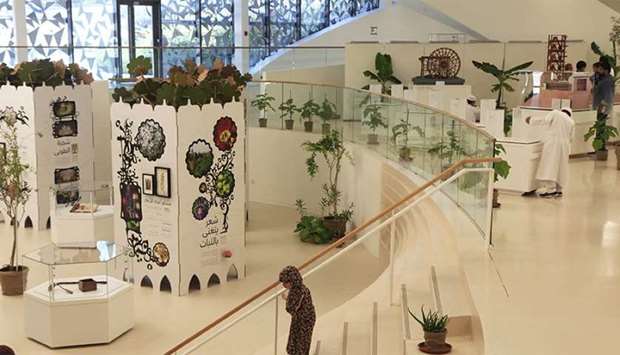The 'Gardens of Al-Andalus' exhibition, brought to Doha by Qatar Foundation (QF) through the Qur'anic Botanic Garden together with Islamic Culture Foundation (Funci) of Madrid and held under the patronage of QF vice-chairperson and CEO HE Sheikha Hind bint Hamad al-Thani, takes visitors during the month of Ramadan on a journey of peace and ecological awareness inspired by the values of Islam.
The exhibition can be visited until May 31 at Hamad Bin Khalifa University’s College of Islamic Studies. It is open every day from 9am until the evening, accompanying the Isha and Tarawih prayers.
The Islamic Culture Foundation, creator of the exhibition, chose the Hispano-Arabic garden as a symbol of understanding and a place for peace and dialogue. During the exhibition’s inauguration in April, Funci president Dr Cherif Abderrahman Jah said: "The message of peace, which is intrinsic to this exhibition, is the same message spread by Islam from the Arabian Peninsula, uniting hearts without prejudice or borders, and to which today the Islamic Culture Foundation wishes to appeal here in Doha."
A visit to the 'Gardens of Al-Andalus' during Ramadan can be seen as a "trip back in time", thanks to the objects on display and the accompanying texts. The quadripartite Islamic garden and, therefore, the gardens of Al-Andalus, are a metaphor for the garden to which every good Muslim aspires, Jannah. Its flowerbeds, separated by four channels, representing the four rivers of Paradise, are planted with some of the species mentioned in the Qur'an: pomegranates, fig trees, olive trees, palm trees, jujube and so on.
The sound of water, the refreshing shade and the fragrances of the flowers invite reflection and recollection. Following its journey through various countries in the Mediterranean and the Middle East, this emblematic exhibition shows a civilisation that loved and respected nature.
According to Dr Jah, the 'Gardens of Al-Andalus' "records one of the brightest periods in the history of humanity and a civilisation that can provide answers to the environmental challenges that future generations will have to face".
The QBG is a member of the Funci conservation platform, 'Med-O-Med, Cultural Landscapes of the Mediterranean and the Middle East', which covers 23 countries in the region.
The botanical and scientific development of Muslim Spain from the eighth to the 15th century led to what specialists have called an authentic 'green revolution' that would eventually transform the fields of medicine, pharmacopoeia, gastronomy and economics.
"Thus, the green spaces of the time, besides being places of rest and spiritual calm, would become gardens of botanical acclimatisation, in which hundreds of new plant species were introduced," a press statement noted. "As a result, for Funci, the 'Gardens of Al-Andalus' reminds us of the values that Islam teaches us in relation to nature, as an example of divine generosity and the development of civilisations."

